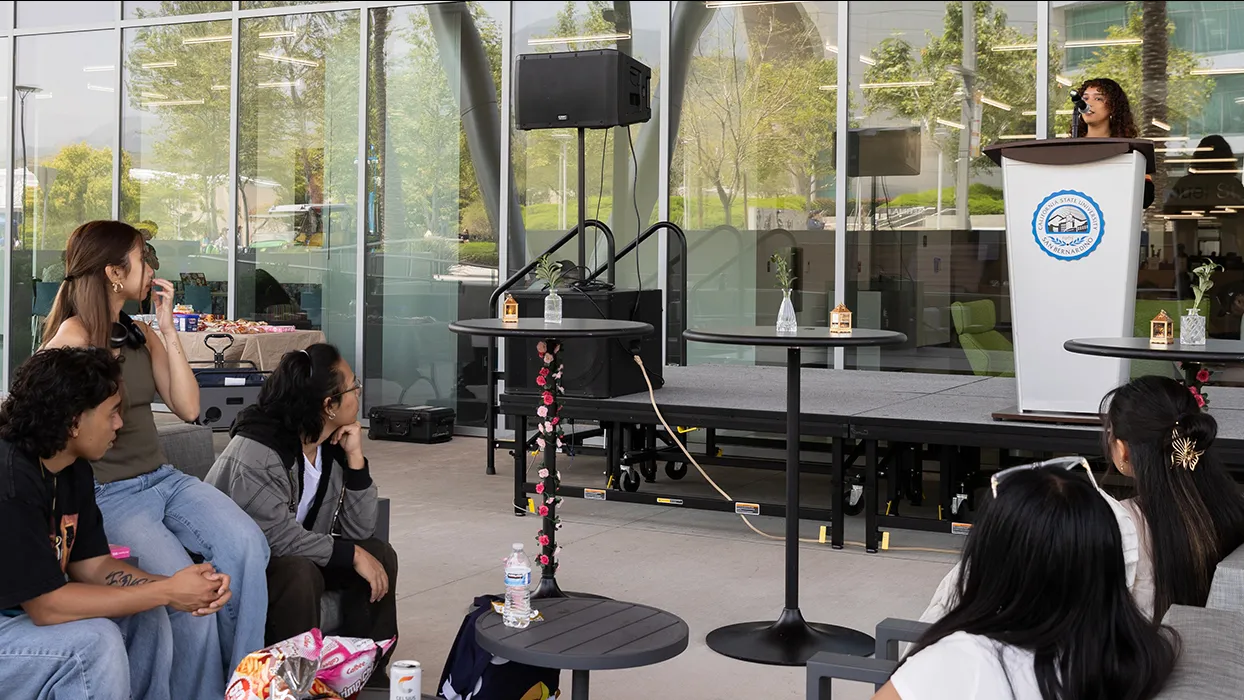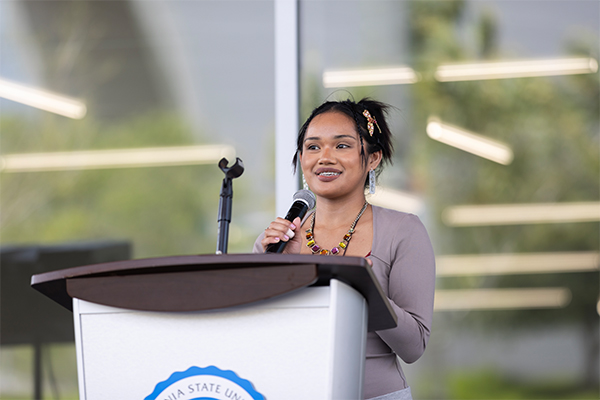Alan Llavore | Office of Strategic Communication | 909-537-5007 | allavore@csusb.edu



Cal State San Bernardino recently concluded monthlong celebrations that honored both Arab American Heritage Month (AAHM) and Asian Pacific Islander Desi American (APIDA) Heritage Month. The festivities culminated in a special event, “Uplifting Identities and Sharing Our History,” which took place on Thursday, May 2, on the Santos Manuel Student Union North patio. This unique joint initiative, organized collaboratively by the AAHM and APIDA Heritage Month committees, aimed to foster understanding and solidarity among diverse campus communities. The event, free and open to the public, provided a valuable opportunity for CSUSB students and the broader community to come together, celebrate diversity, and learn from the experiences of Arab American and APIDA students.
The event featured a student panel, moderated by Ammilyn Deita, a co-chair of the APIDA Heritage Month committee. Deita highlighted the significance of storytelling as a form of resistance and survival for Asian, Pacific Islander, and Desi Americans, as well as Arab Americans. The panel discussion explored the intersecting identities of the students and their motivations for pursuing leadership roles on campus. The event provided a platform for students to share their experiences, challenges, and triumphs, underscoring the importance of diverse representation in student leadership.

The panelists, all student leaders, included Irene Ruano, Urvashi Chawla, Carson Fajardo, and Mazel Margaret Sia. Fajardo, president of Associated Students Inc. (ASI), shared a personal story about how his Filipino great grandfather’s service in World War II led to U.S. citizenship for him and his family. Fajardo expressed pride in his family's history and reflected on the sacrifices of previous generations. He stated, “I always try to be reflective of what that means in my life, of those that came before me that have allowed me to be here, to accomplish things I never could have imagined, and that my grandparents could have never imagined.”
Chawla, president of the Indian Student Organization (ISO), spoke about the challenges and opportunities facing individuals of the Asian diaspora, emphasizing the importance of embracing one's cultural heritage. She stated, "As individuals of the Asian diaspora, we carry the rich culture within ourselves. It starts with embracing who we are and where we come from." She also highlighted the importance of standing together and advocating for each other, saying, "The main thing we can do being Asians at CSUSB is to support each other, stand up for each other, and advocate for each other."
Sia, president of Lubos P.A.S.O., the Philippine-American student organization, highlighted the rich cultural diversity of the Philippines and stressed the importance of unity and standing up for one's beliefs. She shared, "We have such a wide array of unique people in the Philippines, but we have one thing in common, one thing that unites us, we are loud and proud to be Pinoy." Sia emphasized the significance of unity, saying, "Unity, the importance of standing with those who cannot stand for themselves. Be on the right side of history, and stand up for what you believe in."
Ruano, president of the Korean Culture Club, expressed her appreciation for the opportunity to learn more about APIDA and Arab American cultures, despite not having a direct link to these communities in her heritage. She stated, "I’m very honored to be here today and collaborate in honoring the rich cultural heritage of APIDA and Arab American communities."
The event not only celebrated the rich cultural heritages of Arab American and APIDA communities but also aimed to inspire others, foster a more inclusive campus environment, and promote understanding and acceptance of multiple cultural identities.